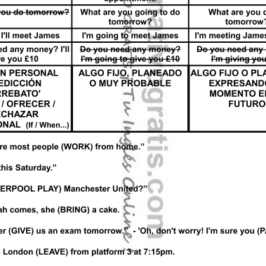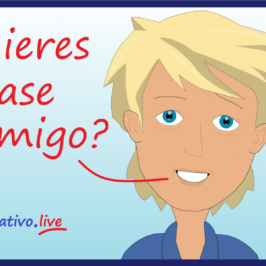Hoy te voy a explicar como usar los superlativos y comparativos en Inglés, y luego os dejo con el ejercicio. Primero hay que empezar con la pregunta básica:
¿Cual es la diferencia entre Comparativos y Superlativos?
Un Comparativo es una comparación entre (normamente) dos personas o dos cosas:
- I am taller than my brothers = Soy más alto que mis hermanos
- English is easier than Spanish = El Inglés es más fácil que el Español
No siempre hay que incluir ‘than…’ cuando la comparación es obvio por contexto:
- It’s colder today, isn’t it? (than yesterday) = Hace más más frio hoy, verdad? (que ayer)
Con el Superlativo no estas comparando nada. Es lo más / mejor / peor de su categoría:
- Jane is the fastest girl in her class = Jane es la chica más rápida de la clase
- The highest mountain is the Everest = La montaña más alta es el Everest
- That film was the most frightening I’ve ever seen! = Esa peli fue la más terrorífica que haya visto jamás!
¡Qúe fácil!
Pues, no. De hecho, es bastante complicado teniendo en cuenta lo sencillo que es en Español. Los cambios de adjectivo base, a comparativo y a superlativo depende de la palabra:
- BIG – BIGGER (than..) – (the) BIGGEST
- EASY – EASIER (than..) – (the) EASIEST
- EXPENSIVE – MORE EXPENSIVE (than..) – (the) MOST EXPENSIVE
- GOOD – BETTER (than…) – (the) BEST
Como ves, es bastante más complicado – por eso estas leyedo esto! Pero no te preocupes. Si dividimos los adjectivos en 3 partes, se hará más fácil de entender:
El Adjectivo tiene 1 Sílaba, o acaba en ‘….Y’
- Adjectivos con una sílaba
Tall Taller (than…) The Tallest
Small Smaller (than…) The Smallest
Few Fewer (than…) The Fewest
Short Shorter (than…) The Shortest
Near Nearer (than…) The Nearest
Nice Nicer (than…) The Nicest
Black Blacker (than…) The Blackest
Cheap Cheaper (than…) The Cheapest
Young Younger (than…) The Youngest
- Adjectivos con una sílaba, repitiendo la última letra
Hay una regla para saber cuando hay que duplicar la última letra, pero casí es más complicado que memorizar los adjectivos*.Mirandolos, tendrás la idea:
Fat Fatter (than…) The Fattest
Big Bigger (than…) The Biggest
Thin Thinner (than…) The Thinnest
Big Bigger (than…) The Biggest
Wet Wetter (than…) The Wettest
Sad Sadder (than…) The Saddest
Red Redder (than…) The Reddest
Hot Hotter (than…) The Hottest
*¿Realmente quieres saber? Se duplica cuando el adjectivo tiene (1) una sílaba (2) acaba en consonante + vocal + consonante, (3) exceptuando cuando el adjectivo acaba en -y o -w ¿Satisfecho?
Adjectivos que acaba en ‘…Y’
Basicamente es la misma regla. Sólo tienes que cambiar el ‘Y’ a ‘I’:
Easy Easier (than…) The Easiest
Naughty Naughtier (than…) The Naughtiest
Pretty Prettier (than…) The Prettiest
Funny Funnier (than…) The Funniest
Scary Scarier (than…) The Scariest
Silly Sillier (than…) The Silliest
Lazy Lazier (than…) The Laziest
Ugly Uglier (than…) The Ugliest
Excepciones!
¿Desde cuando no hay excepciones? Estas palabras tienen una sílaba, pero no siguen la regla:
Wrong More Wrong The Most Wrong
Fun More Fun The Most Fun
Ill More Ill The Most Ill
Like* More Like The Most Like
* = El adjetivo parecido, no eel verbo ‘gustar’
- In my family, I am the most like my father. We are more fun than the rest.
Bored* More Bored The Most Bored
Tired* More Tired The Most Tired
*Adjectives que parten (y son participios) de Verbos: Bore (Aburrir), Tire (Cansar), etc.
2. Dos Sílabas o más
Expensive More Expensive The Most Expensive
Modern More Modern The Most Modern
Frightening More Frightening The Most Frightening
Beautiful More Beautiful The Most Beautiful
Disgusting More Disgusting The Most Disgusting
Interested More Interested The Most Interested
Famous More Famous The Most Famous
Dangerous More Dangerous The Most Dangerous
Y, por supuesto, la excepciones. Palabras que no siguen la regla:
Clever Cleverer The Cleverest
Narrow Narrower The Narrowest
Gentle Gentler The Gentlest
3. Irregular Adjectives
[widgets_on_pages id=”Advert”]Estos 4 adjectivos no siguen ninguna de las reglas arriba:
Good Better (than..) The Best
Bad Worse** The Worst**
Little* Less The Least
Far Further The Furthest***
* = ‘poco’. If you want ‘pequeño’, use ‘small’.
** Has visto ‘Badder’ and ‘Baddest’? Son más bien coloquiales – de canciones, por ejemplo.
***Se puede decir ‘Farther / Farthest’ pero no es tan común
Más Cosas
Estas dos estructuras no cambian jamás. Se usa el adjectivo base. No hace falta cambiar la palabra de ninguna forma:
- As …….. as = Tan ……como
A hippo is as dangerous as a lion = Un hipopotamo es tan peligroso como un león. - Less …… / The least…..
It is less common to see a snow leopard = Es menos común ver un leopardo blanco
Maths is my least* favourite subject = Matemáticas es mi asignatura menos preferida.
*Nota que cuando usas un posesivo (my, your, his,her….), quitas el ‘the’ del superlativo.
- Mira estas dos frases:
I’m less tall than my son.
I’m not as tall as my son.
Significan lo mismo, pero en Inglés es mucha más común la segunda frase. No solemos decir ‘Es menos caro’ sino ‘No es tan caro’. Sigue leyendo, que hay más….
Hay otra estructura, más avanzada:
The older you are, the more tolerant you become = Cuanto más mayor eres, más tolerante te haces
Si quieres saber más de esto, pincha aquí!
Todo lo que has leido aquí es el Inglés según el libro. En el Inglés cotidiano es mucho más flexible, y puedes oír a la gente decir (por ejemplo) ‘more clever’ en lugar de ‘cleverer’ sin problemas.
Resumen (y luego las preguntas)
|
Adjective |
Comparative |
Superlative | |
|
1 Syllable |
TALL |
TALLER than |
the TALLEST |
|
………Y |
EASY |
EASIER than |
the EASIEST |
|
2+ Syllables |
MODERN |
MORE MODERN than |
the MOST MODERN |
|
Irregular |
GOOD BAD |
BETTER than WORSE than |
the BEST the WORST |
Exercises..
Prueba unos ejercicios:








Ibeth
Hola